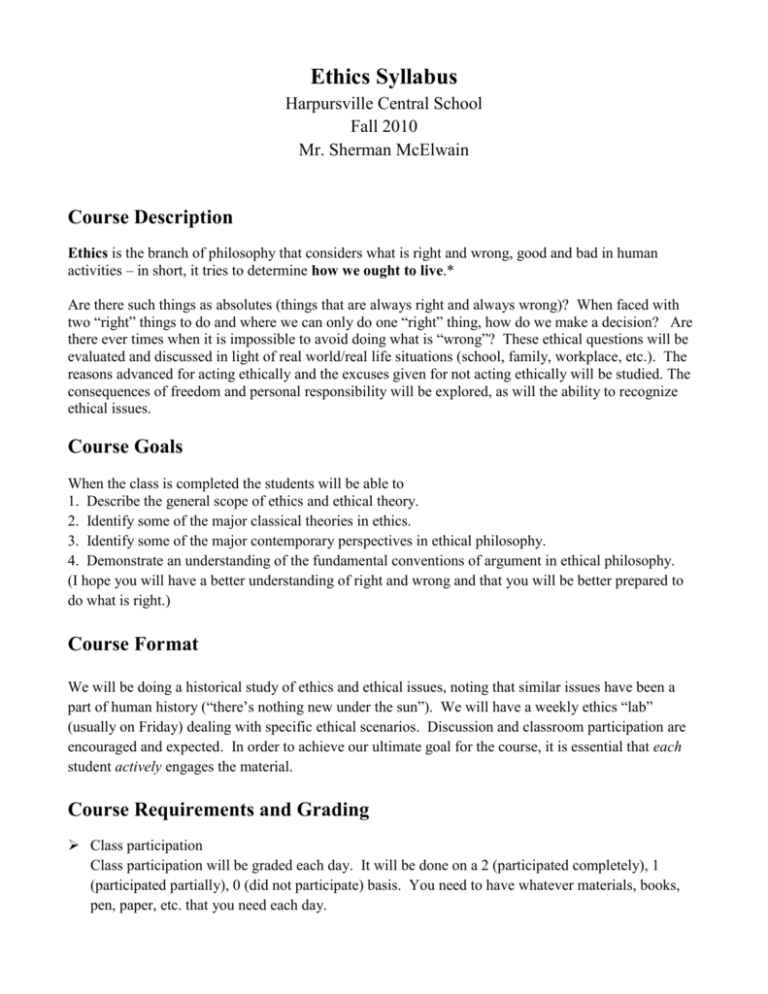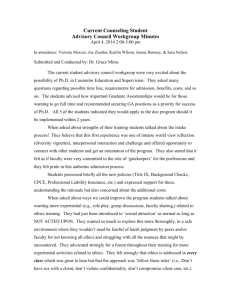Ethics Syllabus - Harpursville Central School District
advertisement

Ethics Syllabus Harpursville Central School Fall 2010 Mr. Sherman McElwain Course Description Ethics is the branch of philosophy that considers what is right and wrong, good and bad in human activities – in short, it tries to determine how we ought to live.* Are there such things as absolutes (things that are always right and always wrong)? When faced with two “right” things to do and where we can only do one “right” thing, how do we make a decision? Are there ever times when it is impossible to avoid doing what is “wrong”? These ethical questions will be evaluated and discussed in light of real world/real life situations (school, family, workplace, etc.). The reasons advanced for acting ethically and the excuses given for not acting ethically will be studied. The consequences of freedom and personal responsibility will be explored, as will the ability to recognize ethical issues. Course Goals When the class is completed the students will be able to 1. Describe the general scope of ethics and ethical theory. 2. Identify some of the major classical theories in ethics. 3. Identify some of the major contemporary perspectives in ethical philosophy. 4. Demonstrate an understanding of the fundamental conventions of argument in ethical philosophy. (I hope you will have a better understanding of right and wrong and that you will be better prepared to do what is right.) Course Format We will be doing a historical study of ethics and ethical issues, noting that similar issues have been a part of human history (“there’s nothing new under the sun”). We will have a weekly ethics “lab” (usually on Friday) dealing with specific ethical scenarios. Discussion and classroom participation are encouraged and expected. In order to achieve our ultimate goal for the course, it is essential that each student actively engages the material. Course Requirements and Grading Class participation Class participation will be graded each day. It will be done on a 2 (participated completely), 1 (participated partially), 0 (did not participate) basis. You need to have whatever materials, books, pen, paper, etc. that you need each day. Classwork/Homework: Classwork/Homework will be graded on a 2 (done well), 1 (incomplete), 0 (not done) basis. If you are absent you are expected to find out what was done in class and what, if any, homework was given. Homework that is late due to legal absence will be accepted according to HCS policy. Ethics Scrapbook: Ethical issues are all around us. To help you prepare to face ethical issues in your “real” life, each student will compile an “Ethics Scrapbook”. Each week you will add one article (newspaper, magazine, or anecdotal) relating to a specific, current ethical issue. Along with the article you will write at least one paragraph explaining what the ethical issue is. You may wish to use some of the following questions to guide you: What is the ethical issue involved? Is there a dilemma involved (a choice between two good options or no good option)? Is someone going against generally accepted ethics? Is there a clash between two sets of different cultural ethics? What might have prevented/corrected the incident? What would you have done if this were you/if this happened to you? [Check calendar for due dates.] Paper/Exams: We will have at least two exams and one major paper (3 pg.) during the course. [Check calendar for due dates.] Community Service: You will do 10 hours of community service during the semester. It may be done in conjunction with community service done for any other HCS course. You may choose where you do your service hours and whether you want to do all 10 hours at one location or split the hours up among two or more locations. You may not do more than two hours at any one time. You must have half of your service done before the end of the 10 wk marking period. The choice of locations is also open. You must get my approval in advance for where you do your service hours. For each session of service, you will file a report (email or paper) answering the following questions: What is the name of the organization? Where was the service done? When did you do the service? How long was this service session? What did you do during for the service? Who was the person(s) in charge (name and contact number)? What is the purpose of the organization? (If the organization has a written purpose statement, include it in your report.) In what ways does the work of this organization reflect the ethics we are studying? Percentages: Class Participation – 20% Class work/Homework – 20% Scrapbook – 20% Paper/Exams – 20% Community Service – 20% *This is a class in ethics (the study of right and wrong). Please do not cheat in this or any other class. That might put me in the position of having to ask you to leave the class.







